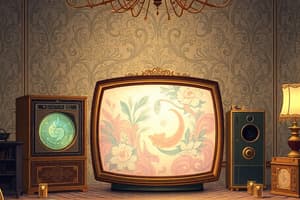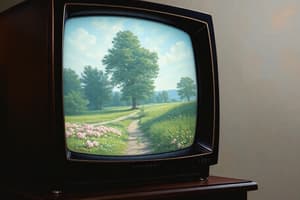Podcast
Questions and Answers
How did concerns over television's influence during the Cold War parallel those about film?
How did concerns over television's influence during the Cold War parallel those about film?
Both were seen as having the power to influence public opinion and potentially spread propaganda, but television was considered more potent due to its constant updates and live broadcasts directly into homes.
Explain the apparent contradiction of Groucho Marx, a TV star, joking about the lack of quality programming on television.
Explain the apparent contradiction of Groucho Marx, a TV star, joking about the lack of quality programming on television.
Marx's joke highlights a tension present since the early days of television, where the medium's potential for thoughtful content was often overshadowed by less meaningful, time-filling 'dreck,' even as many individuals made a living creating such content.
How do you think that concerns about television being 'anti-intellectual' have changed (or not changed) with the rise of streaming services offering high-quality, on-demand content?
How do you think that concerns about television being 'anti-intellectual' have changed (or not changed) with the rise of streaming services offering high-quality, on-demand content?
While streaming services offer more high-quality content, concerns persist due to the sheer volume of low-quality content and the potential for binge-watching to passively consume media, hindering intellectual engagement.
How might the 'least-common-denominator sensibility' of early television have contributed to the medium's widespread adoption and cultural impact?
How might the 'least-common-denominator sensibility' of early television have contributed to the medium's widespread adoption and cultural impact?
In your opinion, is the condescension that some people have towards television justified, considering the diversity of content available today?
In your opinion, is the condescension that some people have towards television justified, considering the diversity of content available today?
How could the communal experience of radio listening, as described, have differed from the experience of watching television in the 1950's and beyond?
How could the communal experience of radio listening, as described, have differed from the experience of watching television in the 1950's and beyond?
What are the crucial differences between concerns about film influencing culture versus television influencing culture?
What are the crucial differences between concerns about film influencing culture versus television influencing culture?
How could you theoretically measure television's impact on society?
How could you theoretically measure television's impact on society?
Flashcards
Television
Television
A mass medium that gained popularity in the 1940s and 50s, raising concerns about its cultural and societal impact.
Least-common-denominator sensibility
Least-common-denominator sensibility
The idea that television's content and programming appeal to the widest possible audience, potentially lowering intellectual standards.
Propaganda concerns in television
Propaganda concerns in television
The fear that television could be used to disseminate political messages and influence public opinion, particularly during the Cold War era.
Anti-intellectualism in television
Anti-intellectualism in television
Signup and view all the flashcards
Dreck
Dreck
Signup and view all the flashcards
Battle for control of television's influence
Battle for control of television's influence
Signup and view all the flashcards
Thoughtful Shows
Thoughtful Shows
Signup and view all the flashcards
Television as medium for Communism
Television as medium for Communism
Signup and view all the flashcards
Study Notes
- When television emerged as a popular medium in the 1940s and 50s, many questioned its potential societal influence.
- Concerns included television's simplistic content and fears that the entertainment industry was promoting Communism.
- The worry was that television could bring the persuasive power of film into homes, with constantly updated and sometimes live broadcasts.
- Control over television's influence has been a constant battle since its emergence as a mass medium.
- Some viewed television as anti-intellectual, advocating for reading instead.
- Condescension toward television content has existed since the medium's beginning.
- Groucho Marx joked about the poor quality of early television programming.
- Throughout television's history, there has been both quality programming and mindless content.
- The chapter will include television's evolution during the latter half of the 20th century.
- The chapter includes the role of the television industry in society.
- The chapter will look at the ways we watch TV and its potential health impacts.
- The chapter will cover television's effects on culture, the possible golden age of TV in the 2000s and 2010s, and audience collaboration.
- Fitchburg State offers a course that covers television from its beginning to the present.
- The Fitchburg State course places particular emphasis on television's sociological influence and impact on the communication process.
Studying That Suits You
Use AI to generate personalized quizzes and flashcards to suit your learning preferences.




